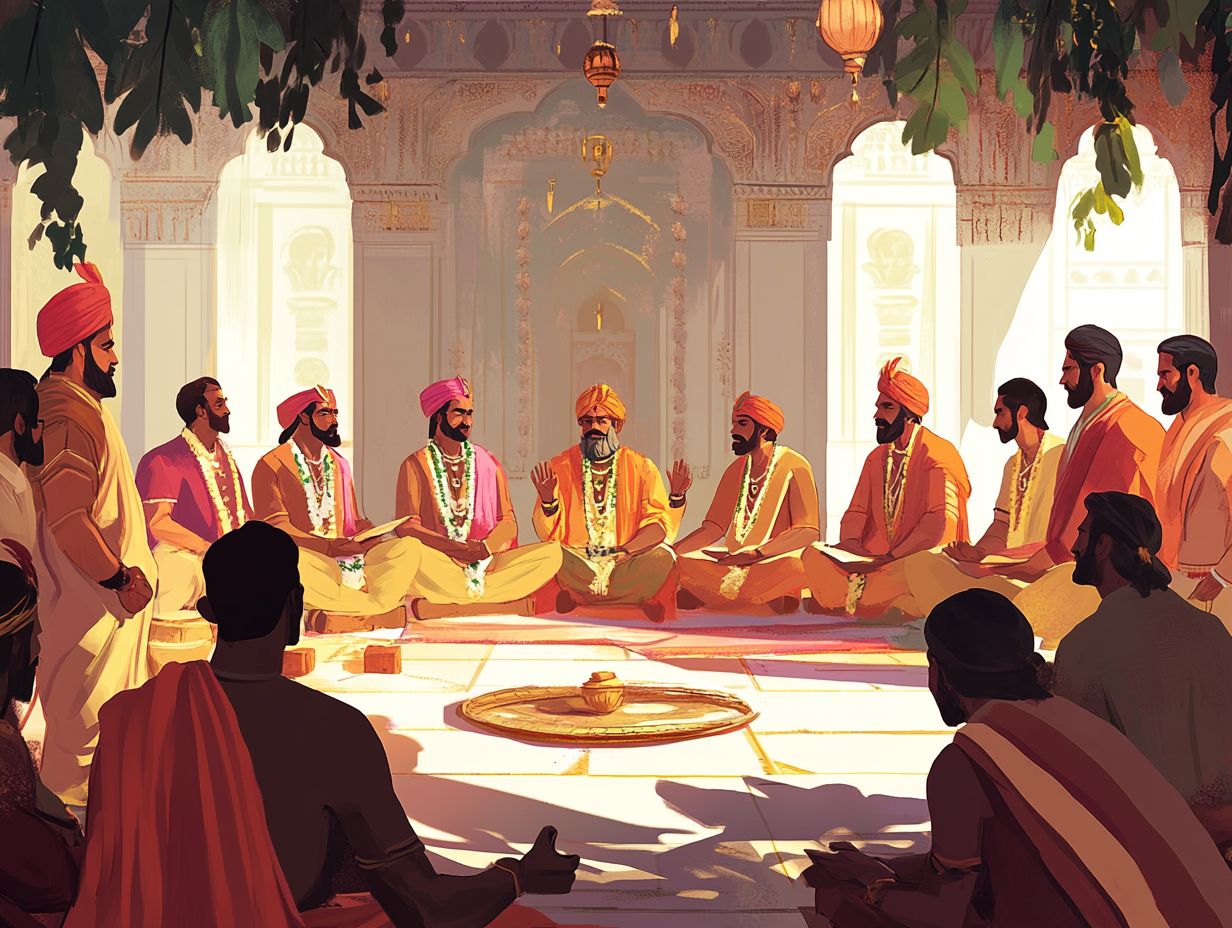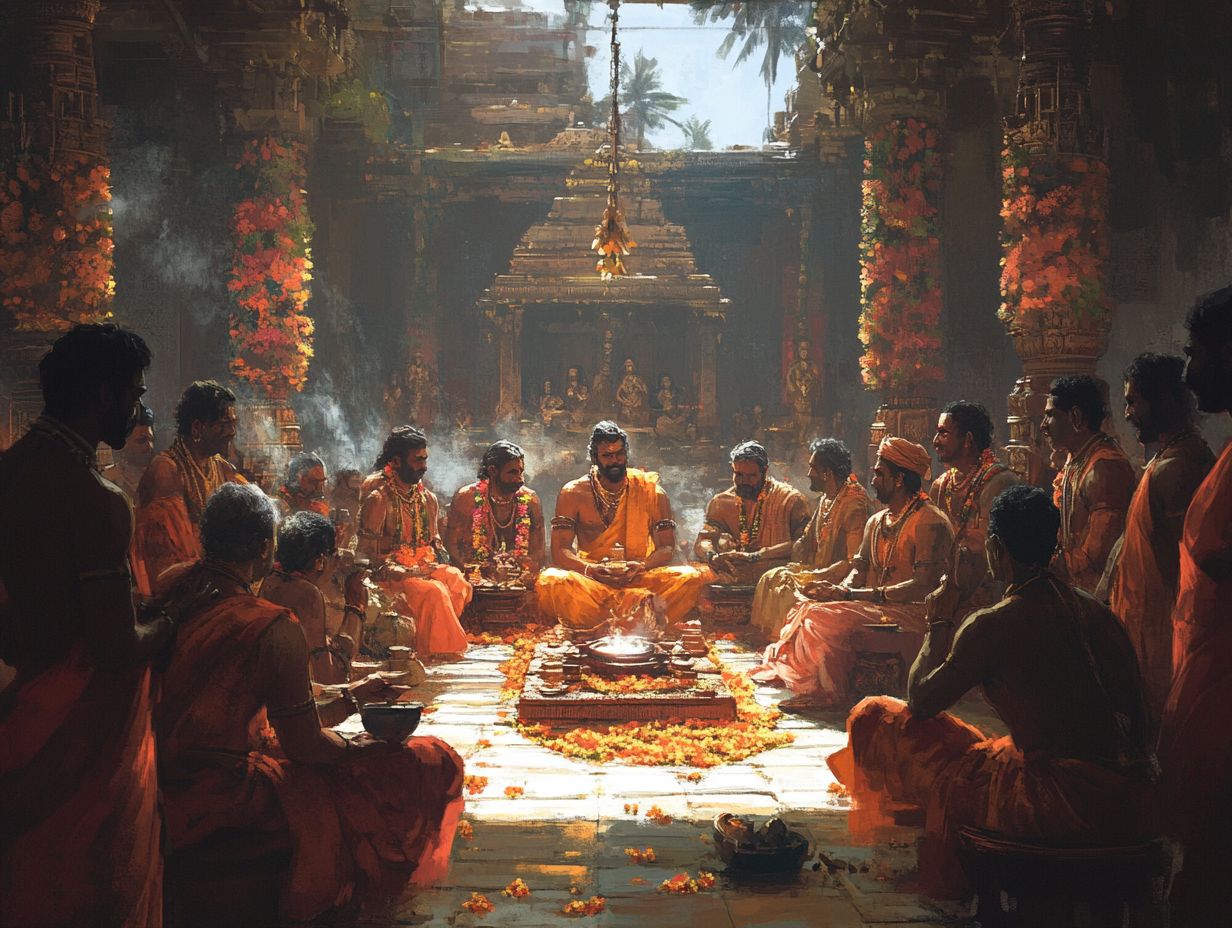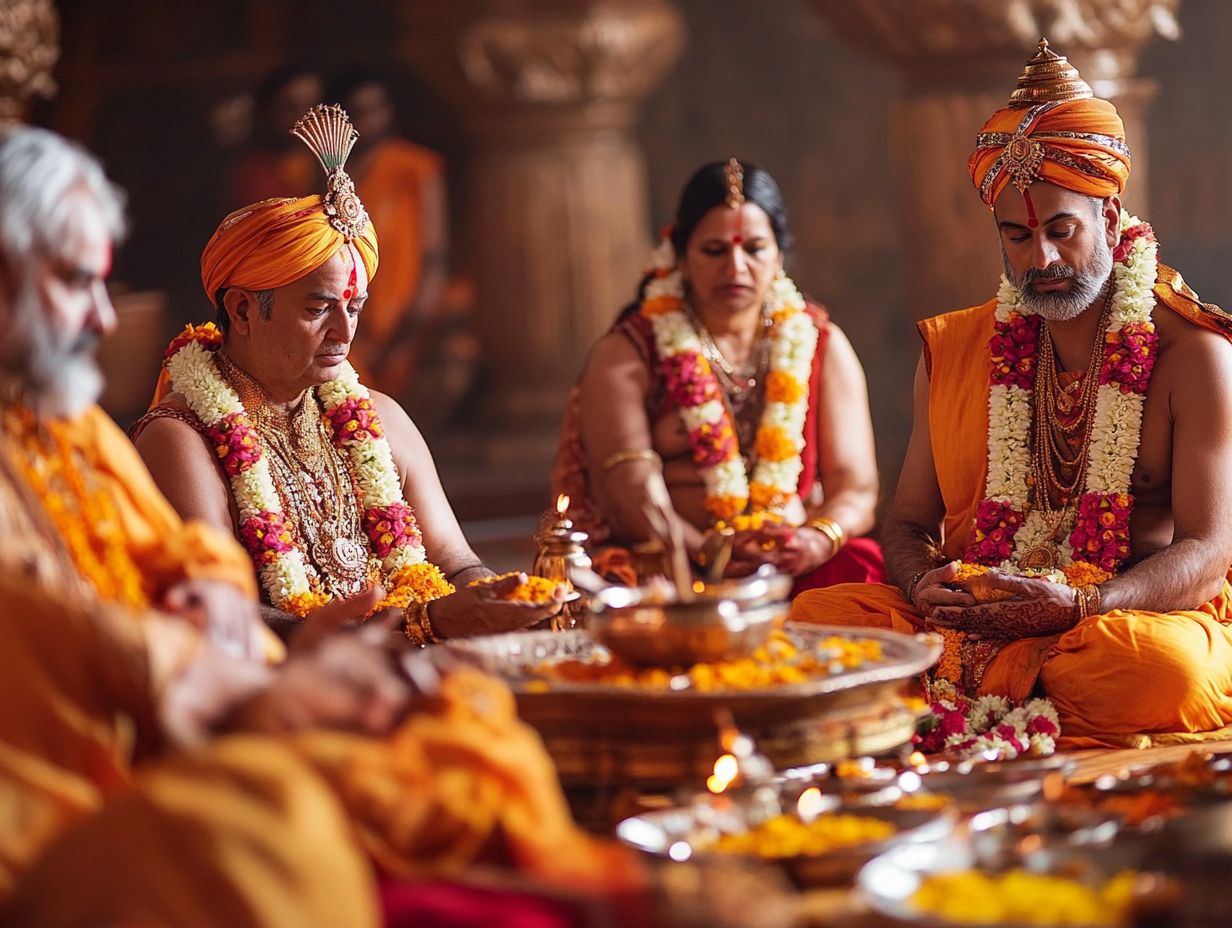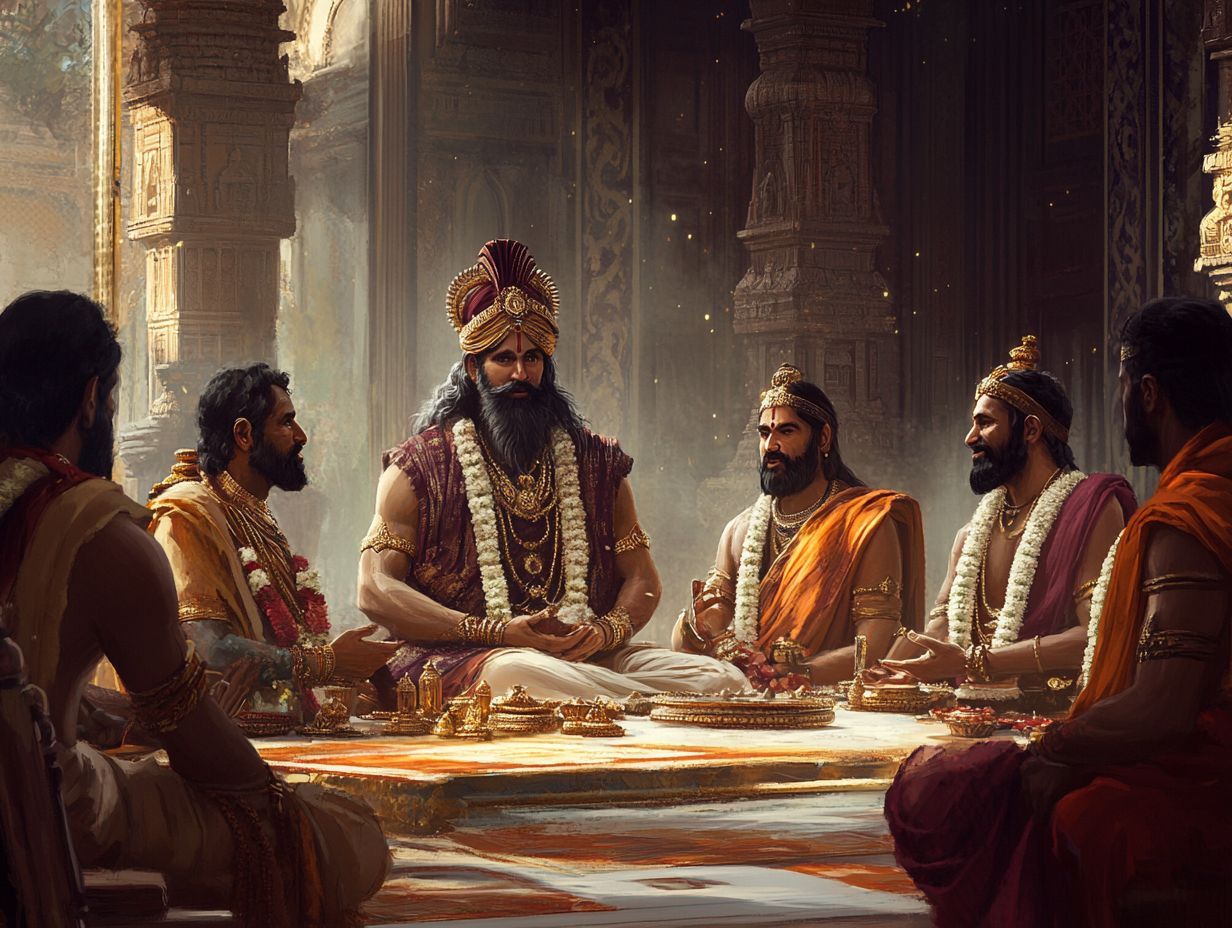How is Hinduism Leadership Organized?
Hinduism stands as a profoundly diverse religion, encompassing a vast tapestry of beliefs, practices, and cultural identities, with leadership occupying a pivotal role in guiding its adherents.
An examination of the leadership structure within Hinduism reveals the importance of various figures, such as Gurus, Swamis, and Pujaris, each entrusted with unique responsibilities that contribute to the community’s spiritual and social fabric, including rites of passage and interfaith dialogue.
The concept of Dharma, articulated in sacred texts like the Vedas and Upanishads, serves as a cornerstone for these leaders, defining the moral framework they are expected to uphold and the virtues they should embody.
This exploration brings to light influential figures like Mahatma Gandhi and Swami Vivekananda, whose enduring impacts on the faith and socio-religious movements continue to resonate.
Delve into the intricacies of leadership in Hinduism and the values that propel it forward, uncovering a rich legacy that shapes the spiritual journey of countless followers, emphasizing holistic development and community resilience.
What is Hinduism?

Hinduism stands as one of the oldest religions in the world, embodying a rich tapestry of traditions, beliefs, and practices that have evolved over millennia. It encompasses a vast array of philosophies, rituals, and cultural expressions, all deeply anchored in the principles of Dharma as articulated in the ancient scriptures known as the Vedas.
At the heart of Hinduism lies the caste system, an intricate social structure that classifies society into distinct groups Brahmins, Kshatriyas, Vaishyas, and Shudras each with its own specific roles and responsibilities within both the community and the spiritual domain.
What is the Role of Leadership in Hinduism?
Leadership in Hinduism holds a pivotal position in shaping the spiritual and social dynamics of the community. Gurus and spiritual leaders emerge as essential guiding figures, endowed with religious authority and moral frameworks that profoundly influence the practices and beliefs of their followers, shaping the cultural heritage and behavioral norms of the faith.
These leaders offer not only spiritual guidance through teachings and rituals but also actively participate in community service and advocacy, thereby nurturing ethical leadership, inclusivity, and social justice within the intricate socio-religious framework of Hindu society.
What is the Concept of Dharma in Hinduism?
Dharma, a cornerstone of Hindu philosophy, embodies the ethical and moral obligations that dictate an individual’s behavior throughout life. This concept encompasses a wide range of responsibilities that shift according to one’s age, caste, and social roles, serving as a compass for followers as they navigate their spiritual practices, community interactions, and engagement in interfaith dialogue.
The teachings of Dharma are intricately woven into the fabric of Hindu traditions, guiding adherents through the intricate challenges of existence with integrity, purpose, and an appreciation for cultural diversity.
Grasping the essence of Dharma is essential, as it not only shapes personal ethics but also molds the collective values of society. By embracing these principles, individuals nurture virtues such as compassion, honesty, and respect, which contribute to communal harmony and social structure.
The significance of Dharma transcends mere personal conduct; it establishes a framework for ethical decision-making, prompting individuals to contemplate the consequences of their actions, fostering inclusivity and communal resilience.
This comprehensive approach cultivates a profound sense of responsibility towards others, promoting a harmonious balance between personal ambitions and the welfare of society. In essence, Dharma serves as a beacon, illuminating the pathways toward righteousness and moral clarity in both individual and communal spheres, fostering an enduring legacy of faith and community engagement.
Who are the Leaders in Hinduism?
The landscape of leadership in Hinduism is a rich tapestry, woven from a multitude of figures, including gurus, priests, and spiritual leaders, each playing a vital role across various sects and communities. Within this intricate framework, leaders from the Brahmin, Kshatriya, Vaishya, and Shudra classes contribute significantly to the socio-religious milieu, offering guidance and support to their followers while steadfastly upholding the time-honored traditions and rituals of Hindu practice, including festivals and ceremonies.
These leaders are not merely facilitators of spiritual education; they serve as moral compasses that shape community values and behaviors. For instance, gurus often take on the role of personal mentors, imparting profound wisdom that transcends routine rituals to foster a deeper understanding of concepts such as dharma and karma. In contrast, priests are primarily dedicated to conducting religious ceremonies, meticulously ensuring that rituals are in harmony with sacred texts and traditional practices, thereby preserving the integrity of the faith.
Leadership roles within these broader social classes exhibit considerable variation, reflecting the intricate interplay between spiritual authority and social responsibilities. Consequently, the leadership structure in Hinduism is a dynamic mosaic, maintaining the rich heritage of this ancient faith through its diverse and influential threads, including the contributions of various monastic orders and ashrams.
How is Leadership Organized in Hinduism?
The organization of leadership in Hinduism is intricately designed around a hierarchical system that clearly defines the roles and responsibilities of various spiritual figures, including gurus, priests, swamis, and community leaders.
This structured framework not only ensures effective governance and administration within religious institutions and practices but also facilitates a seamless process of succession and mentorship. Such an arrangement is vital for preserving the integrity of Hindu traditions and rituals, including those found in temples and other sacred spaces, allowing them to endure through generations.
What is the Role of a Guru?
A guru is an essential figure in Hinduism, acting as a spiritual guide and mentor who bestows knowledge and wisdom upon disciples. Through teachings that encompass philosophy, rituals, and ethical practices, gurus play a pivotal role in shaping the spiritual development of their followers, forging a profound student-teacher relationship that lies at the heart of Hindu education and discipleship.
This relationship cultivates an environment in which disciples can thrive, enabling them to pursue deeper truths and nurture their personal spiritual journeys. The significance of a guru transcends mere instruction; they embody the teachings of ancient texts like the Vedas and Upanishads alongside contemporary practices, providing an invaluable connection to the divine.
By exemplifying integrity, devotion, and compassion, gurus inspire their followers to embrace these virtues in their own lives. Their guidance enables disciples to navigate challenges with wisdom and resilience, nurturing a lineage of spiritual growth that spans generations and enriches the broader community, fostering a deeper sense of spiritual values and ethical living.
What is the Role of a Swami?

A swami is esteemed as a spiritual leader and teacher within Hinduism, frequently linked to monastic traditions and committed to a life marked by service and spiritual discipline. Swamis fulfill a pivotal role in imparting wisdom and guiding their communities through various rituals and traditions, thereby fostering spiritual growth and ethical living among their followers. They also play a significant role in promoting meditation and yoga as part of a holistic approach to spirituality.
Beyond their spiritual teachings, swamis are actively engaged in community service, addressing pressing social issues and uplifting those in need. They conduct workshops, meditation sessions, and spiritual gatherings that not only celebrate traditional practices but also promote moral values and a sense of unity among diverse groups, thereby fostering community engagement and empowerment.
By embodying compassion and selflessness, swamis serve as inspiring role models, encouraging individuals to embrace a disciplined lifestyle grounded in integrity. Their dedicated efforts to promote education, health, and social justice resonate profoundly within the community, underscoring the vital role of spiritual leadership in guiding people toward a more harmonious existence and fostering non-violence and peacebuilding.
What is the Role of a Pujari?
A pujari, or priest, plays a pivotal role in Hindu temples by performing rituals and ceremonies, acting as a vital intermediary between the divine and the community. This position is crucial for conducting worship (puja) and upholding the sanctity of religious traditions, ensuring that the practices resonate deeply with the beliefs and values of the devotees, thereby maintaining the cultural heritage and spiritual values of the faith.
Beyond leading daily rituals, pujaris take charge of overseeing significant festivities and special ceremonies that commemorate important life events, such as weddings, naming ceremonies, and spiritual rites of passage. They meticulously prepare the sacred space, arrange offerings, and invoke blessings from deities, facilitating a profound connection between individuals and the divine, fostering a sense of communal harmony and unity.
Their extensive knowledge of scriptures and traditions enables them to provide spiritual guidance and support, assisting the community in navigating both personal and collective challenges with pastoral care and ethical leadership.
In essence, the pujari s unwavering commitment to their responsibilities fosters a sense of belonging and faith within the community, underscoring the vital role they embody in the richness of Hindu worship and congregational life.
What is the Role of a Pandit?
A pandit is a distinguished scholar within Hinduism, revered for their profound knowledge and expertise in the study and interpretation of scriptures, Vedas, and rituals. Their guidance proves invaluable, as they navigate the community through intricate spiritual teachings and ethical dilemmas, ensuring that traditional practices and Dharma are upheld with the utmost respect and reverence.
These esteemed individuals assume a pivotal role not only in the execution of rituals but also in fostering a deeper comprehension of sacred texts like the Upanishads and the moral principles they encapsulate.
By imparting the significance of various ceremonies and festivals, a pandit influences community engagement and cultivates a sense of unity among individuals, facilitating their connection to their heritage.
Their wisdom aids in the preservation of traditions, transforming ancient insights into practical applications for contemporary life. The presence of a learned pandit enables community members to confront life s challenges, drawing upon the ethical teachings and philosophy that strengthen both spiritual and social bonds.
What is the Role of a Brahmin in the Hierarchy?
Brahmins traditionally occupy a revered position within the Hindu caste system which includes Kshatriyas, Vaishyas, and Shudras, primarily serving as priests and custodians of sacred knowledge. Their roles extend well beyond merely performing rituals; they are tasked with the preservation of traditions, cultural identity, and the impartation of spiritual authority within the community. As leaders, they guide their followers in ethical and moral matters, governance, and social roles.
They are often regarded as custodians of ancient texts and wisdom, ensuring that significant rituals are executed with precision and that the rich tapestry of cultural practices is upheld across generations. This distinctive status not only enhances their influence within the caste system but also positions them at the forefront of social and spiritual governance.
Beyond their ritualistic responsibilities, they play an instrumental role in shaping the community’s values and beliefs, providing a framework within which individuals can seek guidance and support during times of uncertainty. Their unwavering commitment to education, intergenerational teachings, and the pursuit of knowledge further cements their standing as respected intellectuals within society.
What are the Qualities of a Good Hindu Leader in Religious Institutions?
A commendable Hindu leader exemplifies a distinct array of qualities that resonate with the ethical principles and spiritual values inherent in Hinduism, adhering to the teachings of Buddha, Sikhism, Jainism, and interfaith dialogue. These leaders manifest integrity, wisdom, and compassion, creating a nurturing atmosphere of mentorship and guidance within their communities.
They actively engage in outreach, charity, and service, devoted to enhancing the collective well-being of their followers and uplifting the spirit of those they lead.
What Values Should a Hindu Leader Embody?
A Hindu leader ought to embody values such as compassion, integrity, and an unwavering commitment to Dharma, serving as a moral compass and source of spiritual guidance for their community. These values guide their actions and decisions, ensuring that their leadership is deeply rooted in ethical principles and spiritual wisdom, thereby fostering trust and respect among their followers.
At its core, these attributes are intricately linked to the concept of Dharma, which underscores righteousness and duty. A leader who honors Dharma not only inspires those around them but also strengthens the belief in ethical governance and community resilience.
By practicing humility and selflessness, and emphasizing community service, such leaders cultivate an environment where collaboration thrives, aligning the community with elevated values. They confront challenges through a lens of justice and fairness, making decisions that reflect the collective good, community engagement, and social structure rather than their personal interests.
Ultimately, their steadfast adherence to these core principles elevates their leadership, creating a legacy that resonates profoundly with the essence of exemplary leadership within the context of Hinduism.
How Should a Hindu Leader Serve the Community?

Hindu leaders are called to serve their communities through active engagement and outreach, embodying a spirit of charity, inclusion, and support for those in need. By offering mentorship and spiritual guidance, they cultivate a profound sense of community, ensuring that their leadership fosters collective growth and well-being.
These leaders facilitate a myriad of outreach programs designed to assist marginalized groups, providing essential resources such as food, education, and healthcare. Their commitment to charity manifests in the organization of fundraising events and volunteering their time to support local organizations.
Mentorship initiatives, including discipleship and volunteerism, play a pivotal role, as these leaders guide the youth in personal development, instilling values and skills that enable future generations. The emphasis on community service highlights a dedication to a holistic approach, where every action resonates with the core principles of compassion, unity, and active leadership, ultimately enriching individual lives and fortifying the very fabric of society.
What are Some Examples of Hindu Leaders?
Throughout history, a multitude of Hindu leaders have made profound contributions to society, skillfully embodying the principles of leadership and spirituality in their endeavors.
Esteemed figures like Mahatma Gandhi, Swami Vivekananda, and Mother Teresa have left an indelible mark through their teachings and advocacy, shaping the trajectory of both Indian and global history.
Their legacies continue to inspire and resonate, reflecting a commitment to social justice, peacebuilding, compassion, and transformative change.
What are the Contributions of Mahatma Gandhi to Hindu Leadership?
Mahatma Gandhi is widely regarded as a transformative figure in Hindu leadership, celebrated for his unwavering commitment to non-violence and the ethical principles that underpinned India s quest for independence. His influence transcends the realm of politics; Gandhi s spiritual guidance and focus on community engagement have inspired countless generations, championing ideals of harmony and moral integrity.
He seamlessly wove traditional Hindu values into a modern framework of social justice that resonated profoundly with a diverse populace. By advocating for concepts such as Satyagraha, or the force of truth, he not only urged individuals to pursue justice through peaceful means but also cultivated a collective understanding of morality deeply rooted in spiritual practices.
This integration of ethics into daily life played a pivotal role in reshaping community dynamics, highlighting the significance of self-reliance and shared responsibility. Gandhi’s legacy continues to reverberate in contemporary discourse surrounding ethical leadership and spiritual activism, including non-violence and liberation, serving as a poignant reminder of the immense impact that an individual’s principles can wield in catalyzing societal transformation.
How did Swami Vivekananda Influence Hindu Leadership?
Swami Vivekananda significantly influenced Hindu leadership by introducing the philosophy of Vedanta to a global audience, advocating for a spirituality firmly grounded in ethics, meditation, and social responsibility. His teachings highlighted the critical importance of self-realization and service, urging leaders to bridge spirituality with the complexities of the modern world.
As a dynamic thinker, he articulated the universality of spiritual truths, asserting that all religions possess essential wisdom that can guide humanity toward harmony and understanding. By portraying Hinduism as a vibrant and adaptable faith, capable of addressing contemporary challenges, he inspired leaders to embrace a more inclusive approach and pastoral care in their practices.
Vivekananda’s vision of ethical leadership extended beyond personal integrity; it emphasized the responsibility leaders hold toward their communities. He encouraged them to champion social justice, community leadership, and welfare, propelling a renaissance in spiritual thought that helped reshape perceptions of Hinduism and its relevance in a diverse, interconnected world.
What is the Legacy of Mother Teresa in Hindu Leadership?
Mother Teresa’s legacy within Hindu leadership is characterized by her steadfast dedication to charity and community service, embodying the principles of compassion and selfless service that lie at the heart of Hindu values. Her outreach initiatives and spiritual counsel have inspired countless individuals to engage in humanitarian efforts, nurturing a profound sense of interconnectedness, inclusive practices, and adaptive leadership within the global community.
This influence transcends specific religious affiliations, as her actions have catalyzed individuals from diverse backgrounds to adopt a more altruistic approach to their lives. By showcasing the transformative power of love and service, she has motivated leaders within the Hindu community to embrace these ideals, fostering initiatives aimed at addressing poverty, healthcare, education, and holistic development.
Through her relentless commitment to uplifting the lives of the underprivileged, her influence continues to resonate, serving as a poignant reminder to leaders of the necessity of aligning spirituality with tangible acts of kindness. Mother Teresa’s distinctive approach has revolutionized the narrative of community service, instilling a sense of duty and sanctity in the act of helping others, thereby securing her place in history as a beacon of hope and inspiration for countless individuals. Her work exemplifies the integration of ethics and charity, reinforcing the importance of social justice and community engagement.
Frequently Asked Questions
How is Hinduism Leadership Organized?

Hinduism does not have a centralized leadership structure, but instead has a diverse and decentralized leadership system. The organization and hierarchy within Hinduism can vary greatly among different sects and traditions.
Who are the leaders in Hinduism?
The leaders in Hinduism are known as gurus, swamis, and sadhus. They are spiritual teachers who guide and mentor their followers. Additionally, Brahmins, who are part of the traditional caste system, often serve as priests in temples and play significant roles in conducting rituals and ceremonies.
What is the role of gurus in Hinduism leadership?
Gurus play a crucial role in Hinduism leadership as they are seen as the link between the divine and the individual. They provide spiritual guidance and mentorship to their followers. Gurus often teach the Vedas and other sacred texts, imparting valuable philosophy and ethical teachings.
Are there any female leaders in Hinduism?
Yes, there are female leaders in Hinduism called gurus or swaminis. They hold the same authority and respect as male leaders and play an important role in the community. These female leaders often contribute to interfaith dialogue and promote inclusive practices within their communities.
How are leaders chosen in Hinduism?
Leaders in Hinduism are chosen based on their knowledge, wisdom, and spiritual experiences. They are often recognized and accepted by their followers as gurus or spiritual teachers. This recognition is often rooted in lineage and succession, where spiritual authority is passed down through generations.
What is the role of community in Hinduism leadership?
The community plays a significant role in Hinduism leadership. They support and seek guidance from their leaders, and also contribute to the maintenance and development of temples and other religious institutions. Community involvement is essential in organizing festivals, ceremonies, and social roles within the social structure of Hindu society.
